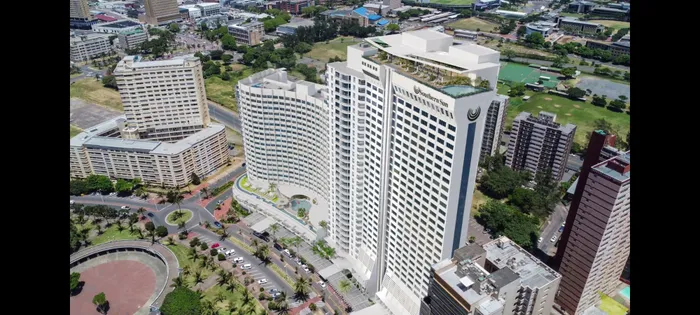
The Elangeni and Maharani hotels are part of the Southern Sun Hotel group.
Image: THULI DLAMINI
Southern Sun says its hotel occupancies might recover to long-term averages in the medium term, aided by the government's policies that encourage economic growth, the JSE-listed group said Wednesday.
Softening inflation, along with South Africa's removal from the Financial Action Task Force's grey list, are tailwinds that signal improved investor confidence and stronger economic growth. However, interest rates remain high and constrain consumer and investor confidence, the group’s management said in financial results for the six months to September 30, 2025.
October 2025 saw the month’s occupancy reach the highest achieved, surpassing even World Cup levels in June 2010, of 73.3%. Revenue grew by 18%. EBITDAR (earnings before interest, taxes, depreciation, amortisation, and restructuring or rent costs) was up 27% on the prior period.
Furthering the group’s prospects, Paradise Sun's relaunch in the Seychelles had been well received, trading at strong occupancy and ARR levels, with the momentum expected to continue into the second half.
In South Africa, major events including the G20 conference, repeat anchor events like the Parliamentary opening and Mining Indaba, as well as various sporting events, were all also expected to support the group's peak summer period.
In the past six-month period, Southern Sun group income increased 5% to R3.1bn, while its South African dividend increased to R3bn. Group EBITDAR was maintained at R818 million, while EBITDAR for the SA division was up 6% to R827m. Net debt at R481m. Adjusted headline earnings per share was flat at 334 cents.
Management described the performance as “resilient”, which had been driven primarily by strong domestic trading. This performance was partially offset by a 29% decline in offshore revenue to R147m, following the temporary closure of Paradise Sun for refurbishment and weaker trading in Maputo and Tanzania.
South African hotels saw occupancy of 60.6% (2024: 59.4%), and a 6% increase in average room rates (ARR) to R1,369, lifting room revenue to R2bn (R1.8bn).
Demand was supported by conferencing, events, and group travel in Gauteng and the Western Cape, while transient corporate and government travel remained subdued due to delayed national budget approvals and Easter timing.
“Recovery in these segments is ongoing, aided by upcoming G20 and B20 conferences,” management said.
The group experienced higher-than-expected cost pressures that weighed on margins, driven primarily by increases in information technology, utilities, and channel costs.
South African EBITDAR increased 6% to R827m, while offshore operations posted a R9m loss (R39m profit).
On September 30, 2025, the group refinanced its debt package into two-year revolving credit facilities. Net interest-bearing debt increased to R481m on September 30, up R215m from the year-end balance of R266m.
Given the seasonal weighting of profits to the second half, no interim dividend was declared.
BUSINESS REPORT